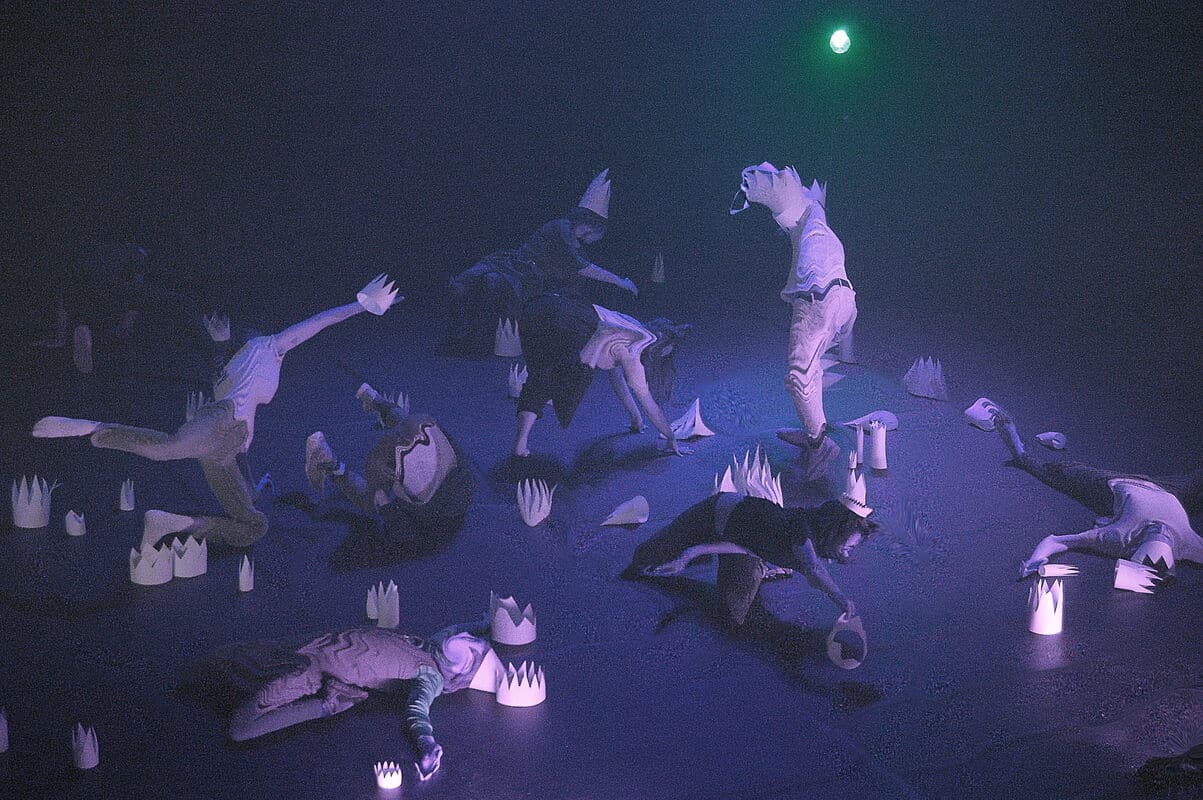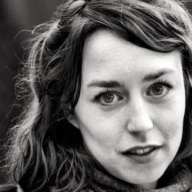Camping Sunset Makes Classic Theatre Repertoire Exciting Again
A traditional stage repertoire performed to a wide audience by a large ensemble might sound rather old-fashioned. The young theatre collective Camping Sunset from Ghent, however, has proven that old and new, traditional repertoire and rock-’n-roll, truly can go hand in hand.
Summer 2019. Eleven young actors from Camping Sunset play Maxim Gorky’s Zomergasten (Summerfolk) on an abandoned industrial estate in the port of Ghent. The makers have only just graduated from the KASK, the Royal Academy of Fine Arts, yet they still blow the audience’s socks off with their fresh adaptations and the evident joy they take in acting. Using minimal resources, they transpose the tired Russian nobility of early last century into the current era. At a rapid tempo, the play switches from a caricatured farce into criticism of bourgeois narrowmindedness and back.
 Camping Sunset, Zomergasten (Summerfolk), 2019
Camping Sunset, Zomergasten (Summerfolk), 2019© Tina Herbots
Camping Sunset has proven that last summer’s success with Happiness, their version of Todd Solondz’ film classic, was not just a one-off. The tragicomic storyline about lonely souls almost desperately in search of sex and affection was clearly made for the collective. Here, again, the production emanated the joy of acting and here, too, they opted for site-specific theatre. The troupe skillfully used the space of an old industrial estate in Ghent, taking up not only the main room but also the stairs and different levels. While costumes and characters were changed at a rapid pace, the tone went from comical to sober, insightful acting.
But that is far from the whole story. Camping Sunset avails itself of a special methodology. Based on the conviction that an actor can only develop in relation to an audience, the collective opts for a short rehearsal phase and long-running performances. In doing so they go against the grain of the stage world. Where it’s not unusual to rehearse for five weeks and only to perform a few times, Camping Sunset rehearses for only two weeks, followed by a long series of performances over three weeks. The show thus continues to evolve during the series of performances. In recognition of that fact, the audience can attend three times on the same ticket: with the specific purpose of finding out how the play has changed.
These ingredients might be summed up as a curious combination of rebellion and tradition. Among other points, the short rehearsal period might be interpreted as a consequence of the sharp criticism the young makers have aimed at the contemporary theatre establishment. They rebel against the shortage of opportunities to act and the limited series of performances with which a great many theatre makers struggle. At the same time, Camping Sunset does not always swim against the current. It has even been suggested that the collective’s poetics are at least nostalgic. In the stage world, after all, a traditional repertoire and large ensemble can easily be associated with the language of old-fashioned theatre.
More makers, less work
In the presentation of Camping Sunset, there’s no getting around the recent history of the Flemish performing arts. In the eighties and nineties, what was termed the ‘Flemish Wave’ dismissed the classic repertoire which was then performed in the city theatres. People opted for a new aesthetic, moving away from the naturalistic, fourth-wall performance of classic drama, which sometimes lacked vision. The new norm consisted of features such as an emphasis on the physical and linked elements from dance, performance, film and music. As a result, classic ensemble performances fell out of favour and even in the theatre schools, text and traditional repertoire often shifted into the background out of a preference for performance and post-dramatic theatre.
 Camping Sunset, Happiness, 2020
Camping Sunset, Happiness, 2020© Tina Herbots
Add to that the fact that professionalization, which persisted hand in hand with the new aesthetic norm, may even have made a deeper impression on the sector. In any case not only was there substantial investment in the decreed framework and courses but also in the framing of the arts themselves. The rise of the art centre model has disadvantaged fixed ensembles, and freelance work has become the norm for artists. Moreover in the past few decades ever more makers have graduated, while since 2010 there have been cuts, reducing the budget available. The artist’s career today must be called precarious at the very least, so it is not surprising, from an economic perspective, that people regularly suggest resurrecting large ensembles with their fixed full-time contracts for performers.
But today’s situation also has artistic repercussions. In 2018 actress and performance instructor Sara De Roo charted the need for actors to perform a great deal in order to develop their craft. Just as a performance needs to grow and mature, so actors can only learn through frequent performance how to gauge an audience, how to respond to a room, how to excel when feeling unwell, how to avoid the trap of performing in a routine manner. The current system offers insufficient opportunities for this.
 Camping Sunset, Ten Oorlog, (To War), 2021
Camping Sunset, Ten Oorlog, (To War), 2021© Bjorn Floréal
The emancipated performer
Enter Camping Sunset. The young company appears to have achieved a synthesis of the past decades. The young makers remind the reader of the joy of a large troupe on stage playing their hearts out. At the same time, they embrace the emancipation of the performer to maker, propagated by recent stage history. Their horizontal structure – just under twenty performers, artists, costumiers and production workers do everything in consultation, working without a director – is contemporary through and through. The same goes for the refusal to acquiesce to the programmers’ logic of a ready-to-go stage show. The desire to avoid repetition and perform differently every evening, too, can hardly be called traditional. This synthesis of old and new is a return to the core of what theatre embraces: performing together for an audience.
Critics will observe that the focus on the joy of performing does not necessarily result in a show that offers much insight into reality. In that respect Camping Sunset ‘simply put on a good play’, which a wide audience can enjoy. But the connoisseur will note that added value depends on analysing their craft. In the summer of 2021, the collective was due a third go. This time they were set to tackle the classic Ten Oorlog (To War) by Flemish writer Tom Lanoye. No shortage of ambition there!












